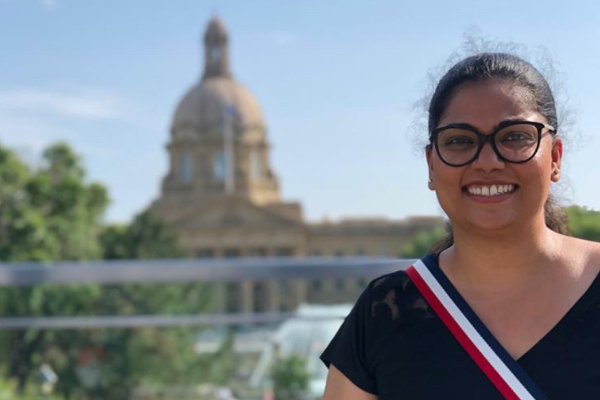
Making her mark in a new country
Jovita Dias is set to graduate on November 9 after completing her Online Master of Public Administration program through the Johnson Shoyama Graduate School of Public Policy. She is one of 12 new JSGS alumni to graduate from this online program.
By Scott Larson, Freelance WriterJovita Dias’s Canadian citizenship ceremony in 2018 was more than just an affirmation of belonging, it was an inspiration to give back to a country that has done so much for her, and it helped lead to her current career path.
“The welcome speech that is given by the judge at the citizenship ceremony is really moving,” said Dias. “When they say, ‘Welcome, you are now a part of Canada, you now also have the right and responsibility for voting and getting a passport.”
Dias understands that this new right and responsibility come with great power, and so that was her personal call to action. She felt that working in the public service was an area where she could apply her strengths.
Born in Mumbai, India, Dias obtained her Master of Communications at the University of Mumbai in 2008 before immigrating to Calgary, Canada in 2011. There, she worked for a couple of years with grassroots community-based organizations until recently with a Primary Care Network as the board & governance advisor.
“I thought of a master’s in public administration because I wanted to understand how the administration of policy worked,” said Dias.
Dias looked at a number of master's programs and decided the online Master of Public Administration through the Johnson Shoyama Graduate School's (JSGS) University of Saskatchewan campus, was the best fit.
“I’ve had other friends take master's programs in public admin online and they were just left on their own devices to do their own studies, to figure out their assignments,” said Dias. “But here there is a strong sense of community among the students as peers, between the students and the professors, and the students and administration.”
“It’s a trifecta of three groups working together to make one student succeed—all students—succeed.”
Dias said right from the start you were given the support you needed.
Emmy Neuls, manager of the graduate programs (distance), was a great resource and help throughout the program, Dias said.
“She knows we are professional people who have different requirements. Emmy walked me through the entire program's requirements and expectations from start to finish, which helps anyone to realize they are not alone in the academic process.”
Dias said the program gives students the flexibility, opportunities, networks, and necessary skills to land what in her case was a dream job. While maintaining her consistently high academic grades, academic program expectations, and full-time job, Dias was awarded a MITACS scholarship to support a Ph.D. candidate in their study on Activating Workplace Allies. In the spring before her final capstone, Dias co-presented the research findings with the principal researcher at the Canadian Coalition of Women in Engineering, Science, Trades and Technology (CCWESTT) conference in Halifax.
“We are all working professionals spread across the country,” she said. “The school understands you need enough lead time for assignments because working professionals need to plan their lives.”
Throughout her MPA program, Dias helped support other students in the program, earning her the title of de facto online MPA student president.
“Online students have different priorities. So, I was a ringleader in bringing communications to the group.”
Halfway through the program, Dias landed a position as a policy analyst with the primary care division at the Ministry of Health with B.C. Public Service and moved to Victoria, British Columbia in the fall of 2021.
Even just one year into the program, Dias said that is what got her the job.
“Our assignments in the program mostly focus on writing briefing notes. Writing good briefing notes is one of the practical skills needed to be a good policy analyst.”
“That must be saying something about the program.”
Taking her master's and working in primary care during a pandemic has definitely had its challenges but has also been highly rewarding at the same time.
“The system has changed and evolved for the better,” Dias said while acknowledging much more needs to be done.
“It's nice to see Canada getting to the stage where you can access your health records digitally, download your lab reports, and have virtual appointments with doctors.”
One aspect of her online MPA program that she did miss out on was being able to participate in the in-person residency, due to the pandemic.
So at Wednesday’s convocation, it will be the first time Dias meets her professors, administrators and fellow students in person.
”I had to show up for convocation,” she said. “That makes it real, that I’ve gone to school.”
“We’ve only seen each other on zoom,” she laughed “I’ve never met anybody in 3D.”
Prior to attending convocation, Dias—who recently moved from primary care to intergovernmental relations in the public service—was assisting in the planning of the first health ministers meeting in Vancouver (November 6-8) since 2018.
“This is an exciting time to be bringing health leaders together to discuss health human resources and mental health and substance use issues among others at the federal, provincial and territorial level,” she said.
Along with Dias, 11 other online MPA students from the first graduating class will receive their parchments today.

